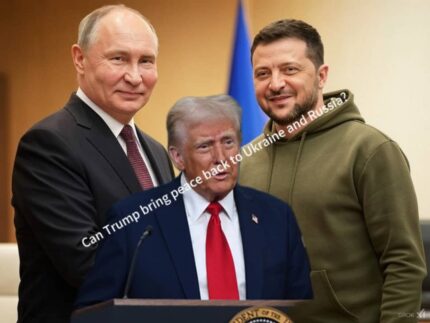In a major diplomatic development, U.S. President Donald Trump announced on Wednesday that peace negotiations to end the ongoing war in Ukraine will begin “immediately.” This decision follows what Trump described as a “lengthy and highly productive” phone conversation with Russian President Vladimir Putin.
According to a statement from the White House, both Trump and Putin agreed on the need to halt hostilities and have directed their respective teams to begin ceasefire discussions. Trump emphasized that Putin “wants peace” and does not want a temporary truce that could lead to renewed fighting in the future. Additionally, the two leaders reportedly agreed to visit each other’s countries in the near future, marking a significant shift in U.S.-Russia relations.
This conversation marks the first direct communication between the two leaders since Trump assumed office last month, signaling a dramatic shift in Washington’s approach to the conflict. It also comes as the Trump administration distances itself from the policies of his predecessor, Joe Biden, who maintained a hardline stance against Russia following its full-scale invasion of Ukraine in 2022.
Trump Engages Zelenskyy, U.S. to Lead Peace Talks
Shortly after his conversation with Putin, President Trump held a separate phone call with Ukrainian President Volodymyr Zelenskyy. In a post on his social media platform, Trump revealed that the discussion focused on opportunities to achieve peace and Ukraine’s technological capabilities, including advanced drone technologies.
Zelenskyy acknowledged the U.S.’s involvement in the negotiations and expressed hope for a peaceful resolution, despite concerns over what concessions Ukraine may be asked to make. He is set to meet with U.S. Vice President JD Vance and Secretary of State Marco Rubio at the upcoming Munich Security Conference to further discuss the situation.
Trump has long claimed that he could end the war in Ukraine “within 24 hours” of taking office, though he has not detailed his exact strategy. His administration, however, has indicated that it will prioritize diplomacy over military aid, a stark contrast to Biden’s policy of extensive military and financial support for Ukraine.
Shifting U.S. Policy: No NATO for Ukraine, No Return to 2014 Borders
A significant shift in U.S. policy toward Ukraine was highlighted by Secretary of Defense Pete Hegseth, who stated that restoring Ukraine’s pre-2014 borders was “an unrealistic objective.” He argued that pursuing such a goal would only prolong the war and lead to further suffering.
Hegseth also confirmed that the U.S. would not support Ukraine’s NATO membership as part of a peace agreement. Instead, he suggested that European nations take on a greater role in providing financial and military support to Ukraine. The Trump administration, he added, intends to focus on securing U.S. borders and countering China, with no plans to deploy American troops to Ukraine.
The remarks sparked immediate reactions from European allies. Leaders from Britain, France, and Germany stressed that any peace deal must include strong security guarantees for Ukraine and that European nations must be part of the negotiations. They warned that without a just settlement, lasting peace would be impossible.
Talks Likely to Begin in Saudi Arabia
Trump hinted that his first in-person meeting with Putin would “probably” take place in Saudi Arabia, though no formal date has been set. The proposed location underscores Saudi Crown Prince Mohammed bin Salman’s growing role as a key player in global diplomacy.
The Kremlin confirmed that Putin has invited Trump to Moscow, and while Trump has not yet committed to visiting Ukraine, he has left the possibility open. Trump’s willingness to engage directly with Putin represents a stark departure from the Biden administration’s approach, as Biden never spoke directly with Putin after the war began.
Meanwhile, the Trump administration has also signaled interest in striking a deal with Ukraine that would grant American companies access to Ukraine’s rare-earth minerals as part of post-war economic recovery efforts. Treasury Secretary Scott Bessent, currently in Kyiv, suggested such a deal could serve as a “security shield” for Ukraine after the conflict.
International Reactions and Uncertainties
The announcement of peace talks has drawn mixed reactions from global stakeholders. While some see it as a positive step toward ending a devastating war, others worry that Ukraine may be pressured into making territorial concessions that undermine its sovereignty.
Russia, which currently occupies around 20% of Ukraine, has insisted on Ukraine’s neutrality and additional territorial concessions as conditions for peace. Ukraine, on the other hand, maintains that Russia must withdraw from all occupied territories and provide security guarantees to prevent future aggression.
The European Union and NATO have expressed concerns over being excluded from the initial negotiations, emphasizing that a lasting peace must be reached through international cooperation. Meanwhile, analysts caution that any agreement brokered primarily between Trump and Putin could result in an outcome that heavily favors Russia.
As Trump moves forward with his diplomatic initiative, the coming weeks will be critical in determining whether these negotiations will bring an end to the Ukraine war or spark further geopolitical tensions.














